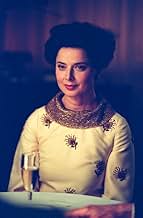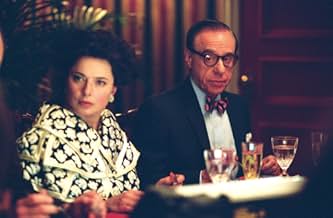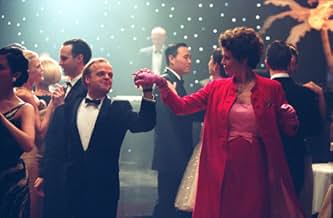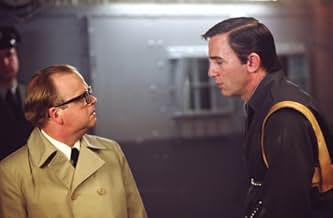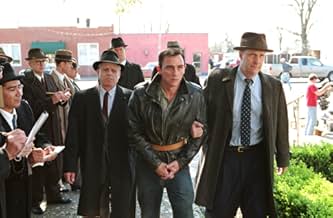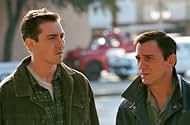NOTE IMDb
7,0/10
19 k
MA NOTE
Tout en effectuant des recherches pour son roman « In Cold Blood », Truman Capote développe une relation étroite avec les meurtriers condamnés Dick Hickock et Perry Smith.Tout en effectuant des recherches pour son roman « In Cold Blood », Truman Capote développe une relation étroite avec les meurtriers condamnés Dick Hickock et Perry Smith.Tout en effectuant des recherches pour son roman « In Cold Blood », Truman Capote développe une relation étroite avec les meurtriers condamnés Dick Hickock et Perry Smith.
- Réalisation
- Scénario
- Casting principal
- Récompenses
- 3 victoires et 2 nominations au total
Frank G. Curcio
- William Shawn
- (as Frank Curcio)
Terri Merritt Bennett
- D.A.'s Secretary
- (as Terri Bennett)
Avis à la une
Writer-director Douglas McGrath's new film about Truman Capote and the creation of his most famous book, "In Cold Blood," is full of contradictions and contrasts when compared with its predecessor, the 2005 film "Capote," that covers the same five-year period. Perhaps this is fitting. There may be some justice in the fact that these two filmic accounts of how Capote researched material for his magnum opus disagree significantly in emphasis and purported events.
After all, Capote used fictional methods to embellish - some might say falsify - his journalistic reportage on the murders of the Clutter family in Holcomb, Kansas, in 1959. If the screenplays for these two films tell differing stories of Capote's experience, does it matter if one is closer to the truth than the other? Or that we can't be sure - indeed, will never know - what actually occurred during many of the encounters between Capote, who was famous for fabricating yarns about his own life, and others out in Holcomb so long ago?
The films are each based on separate biographical accounts. "Capote" was adapted from Gerald Clarke's 1988 biography bearing the same title. "Infamous" is based on George Plimpton's 1997 book, "Truman Capote: In Which Various Friends, Enemies, Acquaintances and Detractors Recall His Turbulent Career," an account presented as a sequence of quotes from interviews Plimpton conducted with more than 150 people who knew Capote.
"Infamous" is far kinder to Capote than the earlier film, portraying him as quite clearly enamored of the killer Perry Smith (an ardor fully requited by Smith) and deeply anguished when Smith is executed. "Capote" depicts the author as more conniving, manipulative and disingenuous, willing to say or do anything to get Smith to spill his story, and withholding of possible interventions he - Capote - might have made to further delay or avert the executions of Smith and his accomplice, Dick Hickock.
In "Capote" the author's erotic attraction to Smith is more muted, hinted at, not acted upon. Indeed, "Infamous" is in general more explicit and direct in its portrayals, often more graphic if you will, than "Capote." Besides kisses and embraces between Capote and Smith, other scenes not covered in "Capote" include moments of violence when Smith virtually attacks Capote in his cell. We also witness the murders of the Clutters and Hickock's execution by hanging, including the protracted interval during which his body remains vertically suspended until he is finally declared dead by the attending physician.
There are other differences, for example, Capote's bid to establish rapport with the local Sheriff, Alvin Dewey, is depicted as much more problematic in "Infamous" than in "Capote." A plus for "Infamous" is its attention to Capote's relationships with a covey of New York society women known as his "swans," their adulation of him, his ability to coax them into sharing their secrets for his later use as gossip fodder. But, again, McGrath employs a graphic style to introduce us to these women, and several others in Capote's social circle, namely, the use of large white name titles as we first meet each, documentary style.
I find it impossible to resist comparing acting performances in the two productions. The more nuanced, oblique style of "Capote" is realized not only through its general avoidance of graphic scenes but in the greater subtlety of the two central actors' performances. In "Infamous," the English character actor Toby Jones physically resembles Capote more than does his counterpart in "Capote," Philip Seymour Hoffman. Both actors offer convincing personifications in voice and style. But I lean toward Hoffman's as the more complex, accomplished turn, characterized by critic Shawn Levy as "note-perfect." Levy goes on, "The wheezy laugh, the pain of work, the prying nature, the cold eye, the self-obsession, the ability to perform and ingratiate and wheedle - it's Capote you're watching up there "
The brilliant English actor Daniel Craig gives a forceful, indeed galvanizing, performance as the killer, Perry Smith. But I think his mercurial, intensely melodramatic interpretation of his character is less convincing than his counterpart in "Capote," Clifton Collins, Jr. Collins's Smith is more introverted, by turns chilling or vulnerable to be sure, but for the most part quietly opaque, subdued, soulfully melancholic. For me this depiction is the more compelling and believable.
Other key performances are well delivered in both films: Catherine Keener ("Capote") and Sandra Bullock ("Infamous") as Harper Lee, though I liked Ms. Bullock's turn better; Chris Cooper ("Capote") and Jeff Daniels ("Infamous") as Sheriff Dewey. Capote's "swans" in "Infamous" are delightfully played by Sigourney Weaver, Juliet Stevenson, Hope Davis and Isabella Rossellini.
So we have two versions of the story of Capote's adventures in Kansas: both strong films, well cast, worthwhile. I think "Capote" is the better film because of its more subtle approach and the performances of the two central actors. As for realism in the interpretation of Truman Capote's character, perhaps the two portrayals taken together triangulate on the "real" Capote, a complex, convoluted personality as worthy of our sympathy as our contempt. My grades: 8/10 (high B+) (Seen on 10/10/06)
After all, Capote used fictional methods to embellish - some might say falsify - his journalistic reportage on the murders of the Clutter family in Holcomb, Kansas, in 1959. If the screenplays for these two films tell differing stories of Capote's experience, does it matter if one is closer to the truth than the other? Or that we can't be sure - indeed, will never know - what actually occurred during many of the encounters between Capote, who was famous for fabricating yarns about his own life, and others out in Holcomb so long ago?
The films are each based on separate biographical accounts. "Capote" was adapted from Gerald Clarke's 1988 biography bearing the same title. "Infamous" is based on George Plimpton's 1997 book, "Truman Capote: In Which Various Friends, Enemies, Acquaintances and Detractors Recall His Turbulent Career," an account presented as a sequence of quotes from interviews Plimpton conducted with more than 150 people who knew Capote.
"Infamous" is far kinder to Capote than the earlier film, portraying him as quite clearly enamored of the killer Perry Smith (an ardor fully requited by Smith) and deeply anguished when Smith is executed. "Capote" depicts the author as more conniving, manipulative and disingenuous, willing to say or do anything to get Smith to spill his story, and withholding of possible interventions he - Capote - might have made to further delay or avert the executions of Smith and his accomplice, Dick Hickock.
In "Capote" the author's erotic attraction to Smith is more muted, hinted at, not acted upon. Indeed, "Infamous" is in general more explicit and direct in its portrayals, often more graphic if you will, than "Capote." Besides kisses and embraces between Capote and Smith, other scenes not covered in "Capote" include moments of violence when Smith virtually attacks Capote in his cell. We also witness the murders of the Clutters and Hickock's execution by hanging, including the protracted interval during which his body remains vertically suspended until he is finally declared dead by the attending physician.
There are other differences, for example, Capote's bid to establish rapport with the local Sheriff, Alvin Dewey, is depicted as much more problematic in "Infamous" than in "Capote." A plus for "Infamous" is its attention to Capote's relationships with a covey of New York society women known as his "swans," their adulation of him, his ability to coax them into sharing their secrets for his later use as gossip fodder. But, again, McGrath employs a graphic style to introduce us to these women, and several others in Capote's social circle, namely, the use of large white name titles as we first meet each, documentary style.
I find it impossible to resist comparing acting performances in the two productions. The more nuanced, oblique style of "Capote" is realized not only through its general avoidance of graphic scenes but in the greater subtlety of the two central actors' performances. In "Infamous," the English character actor Toby Jones physically resembles Capote more than does his counterpart in "Capote," Philip Seymour Hoffman. Both actors offer convincing personifications in voice and style. But I lean toward Hoffman's as the more complex, accomplished turn, characterized by critic Shawn Levy as "note-perfect." Levy goes on, "The wheezy laugh, the pain of work, the prying nature, the cold eye, the self-obsession, the ability to perform and ingratiate and wheedle - it's Capote you're watching up there "
The brilliant English actor Daniel Craig gives a forceful, indeed galvanizing, performance as the killer, Perry Smith. But I think his mercurial, intensely melodramatic interpretation of his character is less convincing than his counterpart in "Capote," Clifton Collins, Jr. Collins's Smith is more introverted, by turns chilling or vulnerable to be sure, but for the most part quietly opaque, subdued, soulfully melancholic. For me this depiction is the more compelling and believable.
Other key performances are well delivered in both films: Catherine Keener ("Capote") and Sandra Bullock ("Infamous") as Harper Lee, though I liked Ms. Bullock's turn better; Chris Cooper ("Capote") and Jeff Daniels ("Infamous") as Sheriff Dewey. Capote's "swans" in "Infamous" are delightfully played by Sigourney Weaver, Juliet Stevenson, Hope Davis and Isabella Rossellini.
So we have two versions of the story of Capote's adventures in Kansas: both strong films, well cast, worthwhile. I think "Capote" is the better film because of its more subtle approach and the performances of the two central actors. As for realism in the interpretation of Truman Capote's character, perhaps the two portrayals taken together triangulate on the "real" Capote, a complex, convoluted personality as worthy of our sympathy as our contempt. My grades: 8/10 (high B+) (Seen on 10/10/06)
"INFAMOUS" ~~ THE OTHER BETTER CAPOTE ... Directed by Douglas McGrath who also wrote the screenplay for Woody Allen's "Bullets Over Broadway" (1994) and directed Paltrow in Jane Austen's "Emma", 1996. Starring Toby Jones as Truman Capote -- one of those rare cases where the actor did not "play" the role but completely entered the skin of the real life character in question. Incredibly "Infamous" was on last night on Hungarian TV, Dubbed into Hungarian but I watched it anyway, for the body language and Production values. And the general feeling of the movie. I had forgotten what an important role a deglamourised Sandra Bullock had in this picture as Capote's constant companion throughout. But the fact that this major Hollywood star was content to take a supporting role to an unknown British actor is a real mark of her professionalism. Interestingly, she smokes in just about every scene she's in, which I assume was just for the requirements of the picture. Toby Jones is head and shoulders better than Seymour Hoffman was in the role, Besides the fact that he is a dead ringer for minuscule real life Capote whereas Bulky Seymour wasn't even close. If there were anything resembling integrity In the Hollywood film world, Jones should have been a walkaway for best actor in 2007 and Bullock would have been a very worthy candidate for Best Supporting actress, female -- Come to think of it, they oughta have a special slot for "Best supporting role by a star leading actor/actress willing to take a back seat" in a quality picture.
I saw "Infamous" at the 2006 Venice film festival and recognized it then as an unsung masterpiece, far far better than the Hoffman caricature earlier the same year. It opens with an incredible turn by Gwyneth Paltrow in a long white gown as Peggy Lee doing the old standard "This must Be Love" -- but she is so touched by the inherent sadness of the song that she breaks down in the middle and has to stop. What an opener! ~ possibly the best single scene Paltrow has ever done. Which sets the tone for everything to come.
A series of interviews follows with celebrity contemporaries of Capote speaking to the camera and identified by name with on screen titles which gives the picture a documentary feel, but the name celebrities are themselves celebrity actors such as Sigourney Weaver and especially, Peter Bogdanovich as Bennet Cerf. I think this is definitely one of the very best pictures of the Decade, 2000- 2010, and one that I would like to own so I could watch it over and over. And don't forget Daniel Craig (later to be Dubble 007!) as death row killer Perry Smith who Capote falls in love with! The prison interviews are filmed in a kind of chiaro-oscuro and the 1959 Period atmosphere is unobtrusively authentic-- without parading collectors vintage cars across the screen in every outdoor scene.
"Infamous", 2006, is a true gem in every respect but fell between the cracks because it was overshadowed by the hullabaloo over the distinctly inferior Sony Pictures production -- a classic case of the triumph of publicity over Quality.
I saw "Infamous" at the 2006 Venice film festival and recognized it then as an unsung masterpiece, far far better than the Hoffman caricature earlier the same year. It opens with an incredible turn by Gwyneth Paltrow in a long white gown as Peggy Lee doing the old standard "This must Be Love" -- but she is so touched by the inherent sadness of the song that she breaks down in the middle and has to stop. What an opener! ~ possibly the best single scene Paltrow has ever done. Which sets the tone for everything to come.
A series of interviews follows with celebrity contemporaries of Capote speaking to the camera and identified by name with on screen titles which gives the picture a documentary feel, but the name celebrities are themselves celebrity actors such as Sigourney Weaver and especially, Peter Bogdanovich as Bennet Cerf. I think this is definitely one of the very best pictures of the Decade, 2000- 2010, and one that I would like to own so I could watch it over and over. And don't forget Daniel Craig (later to be Dubble 007!) as death row killer Perry Smith who Capote falls in love with! The prison interviews are filmed in a kind of chiaro-oscuro and the 1959 Period atmosphere is unobtrusively authentic-- without parading collectors vintage cars across the screen in every outdoor scene.
"Infamous", 2006, is a true gem in every respect but fell between the cracks because it was overshadowed by the hullabaloo over the distinctly inferior Sony Pictures production -- a classic case of the triumph of publicity over Quality.
Unsatisfied with 'Capote', I turned to 'Infamous', and was pleased with what was given. Jones' performance lets us see a lot more of Truman Capote; the 'wind-up toy', the wit, the manipulation, and the years of suffering were performed expertly and such contrasts and comedic breaks added more dimension than Hoffman's version. Harper Lee's importance was appropriately heightened in this movie, which I applaud.
'Infamous' portrays the entirety of the Clutter murders as I had Imagined from 'In Cold Blood'. We get a good overview, however incomplete, as crucial details about Perry are omitted, and the theme of sexuality takes a more obvious stand. While an interesting thought, I feel it muddies Perry's character a little; his reasoning is not quite clear nor correct. I don't really feel Craig was right for the role; there's a certain immaturity he doesn't quite exude.
Overall, I enjoyed this film and appreciated its varying tone and Toby Jones' Capote. It was refreshing and more satisfying than the flatly sombre atmosphere in 'Capote'.
'Infamous' portrays the entirety of the Clutter murders as I had Imagined from 'In Cold Blood'. We get a good overview, however incomplete, as crucial details about Perry are omitted, and the theme of sexuality takes a more obvious stand. While an interesting thought, I feel it muddies Perry's character a little; his reasoning is not quite clear nor correct. I don't really feel Craig was right for the role; there's a certain immaturity he doesn't quite exude.
Overall, I enjoyed this film and appreciated its varying tone and Toby Jones' Capote. It was refreshing and more satisfying than the flatly sombre atmosphere in 'Capote'.
Infamous has a difficult comparison with the earlier "Capote." Still it is a different view of the same story and characters and is written with more emphasis on the perspectives of those who knew, or thought they knew, Capote. Toby Jones may not fully match the nuanced performance of Philip Seymour Hoffman but he does, possibly, a better imitation of Capote. Infamous has a better known cast of supporting players and they do a creditable job. Sandra Bullock's Harper Lee isn't the quite same as that portrayed so well by Catherine Keener in "Capote" but her character blends perfectly with the tone of "Infamous." Daniel Craig adds another fine acting turn as the "In Cold Blood" killer who receives the most attention. Even Gwyneth Paltrow makes an excellent impression in a brief opening scene as, apparently, singer Peggy Lee. (In the showing I saw, she was introduced as "Kitty Dean???") I wondered why another version of this story was filmed and it may not do well after the success of "Capote" but I was surprisingly entertained and intrigued by this movie.
Greetings again from the darkness. What a unique film-going experience. Having the opportunity to see two takes on the same subject matter within a year or so is pretty rare in Hollywood. It happened most recently with "Tombstone" and the vastly inferior "Wyatt Earp". Rarely does it happen when both films are exceptionally well made and acted ... as is the case with last year's "Capote" and now, "Infamous".
First of all, you must understand that the films are actually based on different books. "Infamous" is based on George Plimpton's book in which he really tries to capture Truman Capote, the man and the genius. Because of this, director Douglas McGrath ("Nicholas Nickleby" and "Emma") utilizes some faux-interview segments, much like a "Biography" segment on television. Of course, both films center around the process of Capote researching and writing his masterpiece "In Cold Blood" based on the brutal slaying of a Kansas family in their farmhouse. They both also explore Capote's bizarre relationship with Perry Smith (played brilliantly here by the next James Bond, Daniel Craig). The sexual tension between the two is palpable, but we continue to question if Capote is merely manipulating Smith for the story or if, in fact, there is real substance to the attraction. We will never know if his reaction on death row is heartbreak or guilt. The mystery adds to the power of the story.
The cast in this film is nothing short of spectacular. From the opening moments with Gwyneth Paltrow portraying the great Peggy Lee in a melancholy stage moment to Sigourney Weaver, Hope Davis, Isabella Rossellini and Juliet Stevenson doing the twist, the actresses are terrific - as are their amazing costumes! In addition to Daniel Craig as Perry Smith, Lee Pace (as Dick Hickcock), Jeff Daniels as the sheriff and ("Last Picture Show" director) Peter Bogdanovich as Bennett Cerf, the actors are also top notch.
Toby Jones as Truman Capote is much more flamboyant and colorful than the amazing performance by Phillip Seymour Hoffman last year. Many will try to compare, but what I say is, enjoy them both for their high level of artistry! Now for something I never thought I would put in writing. Sandra Bullock is extremely effective as Nelle Harper Lee (Capote's muse and of course, the author of "To Kill a Mockingbird"). Bullock usually flips her hair and bumbles all cutesy-like through her performances, but not here. She plays Ms. Lee straightforward and tough, just like the real thing. How wonderful.
Yes, the story is still heart-wrenching, but "Infamous" provides much more levity, humor and color than the more somber "Capote". Both are wonderful films with excellent casts. Enjoy them both as fine film-making seems to be a rare commodity these days.
First of all, you must understand that the films are actually based on different books. "Infamous" is based on George Plimpton's book in which he really tries to capture Truman Capote, the man and the genius. Because of this, director Douglas McGrath ("Nicholas Nickleby" and "Emma") utilizes some faux-interview segments, much like a "Biography" segment on television. Of course, both films center around the process of Capote researching and writing his masterpiece "In Cold Blood" based on the brutal slaying of a Kansas family in their farmhouse. They both also explore Capote's bizarre relationship with Perry Smith (played brilliantly here by the next James Bond, Daniel Craig). The sexual tension between the two is palpable, but we continue to question if Capote is merely manipulating Smith for the story or if, in fact, there is real substance to the attraction. We will never know if his reaction on death row is heartbreak or guilt. The mystery adds to the power of the story.
The cast in this film is nothing short of spectacular. From the opening moments with Gwyneth Paltrow portraying the great Peggy Lee in a melancholy stage moment to Sigourney Weaver, Hope Davis, Isabella Rossellini and Juliet Stevenson doing the twist, the actresses are terrific - as are their amazing costumes! In addition to Daniel Craig as Perry Smith, Lee Pace (as Dick Hickcock), Jeff Daniels as the sheriff and ("Last Picture Show" director) Peter Bogdanovich as Bennett Cerf, the actors are also top notch.
Toby Jones as Truman Capote is much more flamboyant and colorful than the amazing performance by Phillip Seymour Hoffman last year. Many will try to compare, but what I say is, enjoy them both for their high level of artistry! Now for something I never thought I would put in writing. Sandra Bullock is extremely effective as Nelle Harper Lee (Capote's muse and of course, the author of "To Kill a Mockingbird"). Bullock usually flips her hair and bumbles all cutesy-like through her performances, but not here. She plays Ms. Lee straightforward and tough, just like the real thing. How wonderful.
Yes, the story is still heart-wrenching, but "Infamous" provides much more levity, humor and color than the more somber "Capote". Both are wonderful films with excellent casts. Enjoy them both as fine film-making seems to be a rare commodity these days.
Le saviez-vous
- AnecdotesThis film appeared not long after the film Truman Capote (2005). While Infamous goes deeper into the background of the killers, Capote focuses intensely on the relationship between Capote and Smith. As such, the two films could be considered to be companion pieces.
- GaffesEarly in the movie Harper Lee and Capote order drinks in a Holcomb, Kansas restaurant. At the time of the movie's action, Kansas was dry as a bone. You couldn't buy a drink in a Kansas restaurant until state liquor laws began to change in the mid '80s.
- Citations
Truman Capote: Imagine being told your work lacked kindness by a four-time killer!
Meilleurs choix
Connectez-vous pour évaluer et suivre la liste de favoris afin de recevoir des recommandations personnalisées
- How long is Infamous?Alimenté par Alexa
Détails
- Date de sortie
- Pays d’origine
- Site officiel
- Langue
- Aussi connu sous le nom de
- Infamous
- Lieux de tournage
- Marlin, Texas, États-Unis(Courthouse exterior and interior scenes)
- Sociétés de production
- Voir plus de crédits d'entreprise sur IMDbPro
Box-office
- Budget
- 13 000 000 $US (estimé)
- Montant brut aux États-Unis et au Canada
- 1 151 330 $US
- Week-end de sortie aux États-Unis et au Canada
- 452 966 $US
- 15 oct. 2006
- Montant brut mondial
- 2 689 799 $US
- Durée
- 1h 50min(110 min)
- Couleur
- Mixage
- Rapport de forme
- 1.85 : 1
Contribuer à cette page
Suggérer une modification ou ajouter du contenu manquant




